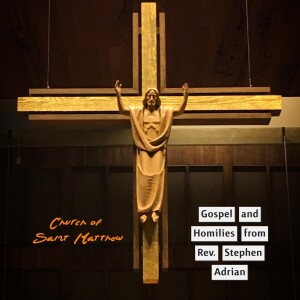
Wednesday Apr 19, 2023
10.04.2020 Homily
The gospels are not biographies of Jesus. They are reflections on the life and the teaching of Jesus that come out of local communities of faith. And those communities of faith are communities that have lived some distance from the time of Jesus' ministry.
The gospel according to Matthew was probably written around the year 80. So it's 50 years after the death and resurrection of Jesus, and it was written by a community living in Syria. And that community was made up of Jewish converts to Christianity and Gentile converts to Christianity. And there was a fierce tension between those two groups. And so in putting forth this text of the gospel of Matthew, particular teachings and passages are chosen that will be of particular help to this community.
Both the Jews and the Gentiles wanted each other to embrace fully what they embraced and to reject fully what they have come to. So the Jewish converts wanted the Gentiles to become Jews, and the Gentile converts wanted the Jews to forsake all of Judaism. Each one wanted it all. Each one wanted the whole loaf of bread. They were unwilling to share. They were highly competitive.
Now the message of the story that Jesus is teaching is that we do not own that vineyard, the vineyard of the church, the vineyard of the Christian community, the vineyard of this community. We don't own that. We live there and we work there, but it's not ours.
Now the tenant farmers wanted the vineyard for themselves. They weren't happy being tenants. They wanted to be owners, just like the various factions of that community wanted everything to be their way. The tenant farmers wanted the inheritance. They wanted it all. They wanted it all for themselves. Their isolation had turned them greedy and they grabbed for everything they could get. They excluded others because they wanted it all, and when more were included, when others were included, they instinctively thought that they would have less.
And the message is when you want it all, you inherit nothing. And that's what Matthew was trying to teach his community, that we must all share in this vineyard. We must all work in this. It's not ours. The inheritance belongs to the community and each of us is different. And we cannot exclude the others.
Well, it's a message that's also important for us, for the church today, for communities of faith. That the way I see life, the way I hold on to life, the way I live life, may be different from what my neighbor does. My neighbor may be very different from me, different by culture, different by experience, different by
national origin, different in so many ways. And I cannot demand that that person see the world like I see it. I cannot demand that that person experience what I experience, in the way I experience it. There's got to be room in this vineyard, this community, for that person to be who he or she is and for me to be who I am. And you can carry that much larger, you can carry that to the civil society.
We have no right to demand that my neighbor be just like me. There is no way in which I have a right to denigrate that neighbor, just because that neighbor comes from a different part of the world or that neighbor speaks a different language, or that neighbor looks different from me. And maybe that neighbor is a newcomer here. I cannot own this all for myself. I must be willing to include others because the gift is much bigger than I am. The vineyard is much bigger than I am. The community of the world is much bigger than I am, and I cannot have it all my way.
So Jesus invites his hearers through that parable to remember that what God has chosen, he has chosen often from the least, and he has made of that something great. And you and I are invited to also look for those who are on the margins and to see them as being a gift, not a liability, a gift to enrich the community in which we live.
No comments yet. Be the first to say something!